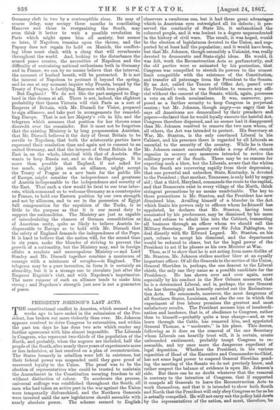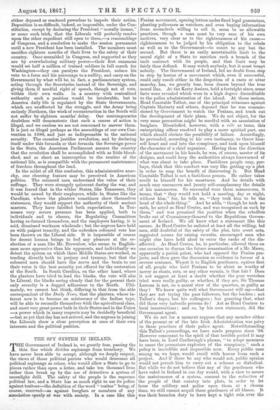PRESIDENT JOHNSON'S LAST ACTS. T HE constitutional conflict in America, which
seemed a few weeks ago to have ended in the submission of the Pre- sident, has broken out more violently than ever. Mr. Johnson appears resolved to drive Congress to extremities, and within the past ten days he has done two acts which render any further agreement with him almost impossible. The Liberals in Congress, who represent two-thirds of the population of the North, and probably, when the negroes are included, half the people of the South, after nearly three years of experiments more or less indecisive, at last resolved on a plan of reconstruction. The States formerly in rebellion were left in existence, but their federal power was suspended until they gave proof of recovered loyalty to the Union. The proof was to be the election of representatives who could be trusted to maintain the Amendment in the Constitution securing freedom to all without distinction of colour. To accelerate the process, universal suffrage was established throughout the South, all men who had taken an active part in the war against the Union were temporarily disfranchised, and the Northern Generals were invested until the new legislatures should assemble with nearly absolute power. The scheme seemed to English observers a cumbrous one, but it had three great advantages, which in American eyes outweighed all its defects ; it pre- served the continuity of State life, it enfranchised, the- coloured people, and it was lenient to a degree unprecedented' in the history of civil wars. The result, it was hoped, would be the election of legislatures devoted to the Union, and sup- ported by at least half the population; and it would have been,. but that Mr. Johnson, though ostensibly a Unionist, was really devoted to democratic and. State-right ideas. He would, it was felt, work the Reconstruction Acts so perfunctorily, and the old parties were so animated by his protection, that Congress was compelled to stretch its powers to the utmost limit compatible with the existence of the Constitution, and transfer all patronage from the President to the Senate, By an Act, called the Tenure of Office Act, passed over the President's veto, he was forbidden to remove any offf- cial without the consent of the Senate, which, again, possesses. a veto on. all fresh nominations. It was, moreover, pro- posed as a further security to keep Congress in perpetual session ; but Mr. Johnson, though angry—so angry that he- says all Americans are demoralized by their preachers and, papers—declared that he would loyally execute the hateful Act. Congress therefore dispersed, and no sooner had it disappeared, than Mr. Johnson resolved to remove the two men whom, of- all others, the Act was intended to protect. His Secretary at War, Mr. Stanton, is the only convinced Liberal in his. Cabinet, and his presence there is regarded by all Liberals as-. essential to the security of the country. While he is there- Mr. Johnson cannot successfully strike a coup d'e'tat, cannot organize in secrecy any measures intended to revive the: military power of the South. There may be no reasons for expecting such a blow, but the Liberals, aware that the whitefs, in the South are recovering rapidly from their depression;_ that one powerful and unbroken State, Kentucky, is devoted. to the President ; that another, Tennessee, is only held by negro. aid ; that a third, Maryland, commands the route to the capital,. and that Democrats exist in every village of the North, think stringent precautions by no means unadvisable. The key to those precautions is Mr. Stanton, and the President has now dismissed him. Availing himself of a blunder in the Act which limits his powers only to officers whom he fiimself has appointed, he declares that Mr. Stanton, having been- nominated by his predecessor, may be dismissed by his mere flat, and refuses to admit him into the Cabinet, transacting all business through an officer whom we should call the Military Secretary. He passes over Sir John Pakington, to deal directly with Sir Edward Lugard. Mr. Stanton, on his part, refuses to accept his dismissal, and the department would be reduced to chaos, but for the legal power of the - President to act if he pleases as his own Minister at War. - Then, as if to show that he is not acting from mere dislike of Mr. Stanton, Mr. Johnson strikes another blow at an equally important officer. Of all the Generals in the service of the Union, General Sheridan is, perhaps, the one dearest to the Liberal chiefs, the only one they name as a possible candidate for the Presidency. He has shown over and over again, more- especially by his conduct in the New Orleans massacre, that he is a determined Liberal, and is, perhaps, the one .General who has thoroughly and honestly carried out the Reconstruc- tion Acts. He commands, moreover, the most dangerous of all Southern States, Louisiana, and also the one in which the experiment of free labour promises the greatest and most satisfactory results. The President accuses him of insubordi- nation and insolence, that is, of obedience to Congress, rather than to himself—probably quite a true charge—and, as we learn through the Cable, has removed. him, and appointed General Thomas, a " moderate," in his place. This decree, following as it does on the removal of the one Secretary whom Liberals can heartily trust will, it is certain, create unbounded excitement, probably tempt Congress to re- assemble, and try once more the dangerous expedient of legal deposition. Whether the President, in his various- capacities of Head of the Executive and Commander-in-Chief, has not some legal power to suspend General Sheridan pend- ing the meeting of the Senate we do not precisely know, and rather suspect the balance of evidence is upon Mr. Johnson's side. But there can be no doubt whatever that the removal is contrary to the intention of Congress, that if supported it compels all Generals to leave the Reconstruction Acts to work themselves, and that it is intended to show both South and North that the President will only obey Congress so far as he is actually compelled. He will not carry out the policy laid clow'n by the representatives of the nation, and must, therefore, -be
either- deposed or rendered powerless to impede their action. Deposition is so difficult, indeed, so impossible, under the Con- stitution, except by declaring the President "morally insane," or some such trick, that the Liberals will probably resolve upon the other expedient still open to them,—a reassemblage of Congress, and a, resolution to make the session permanent until a new President has been installed. The members must sacrifice eighteen months of their lives to the safety of their country. Once assembled in Congress, and supported as they are by overwhelming military power—their first summons would set half a million of trained soldiers in full march for Washington—they can paralyze the President, reduce his veto to a form and his patronage to a nullity, and carry on the Government by what will be, in fact, a parliamentary system, acting through the Secretaries instead of the Sovereign, and giving them if needful right of speech, though not of vote, within their own walls. In a country with centralized authority such a position would be intolerable, but in America daily life is regulated by the State Governments, which are unaffected by the struggle, and the Army being entirely Northern, the work of reconstruction in the South will not suffer by eighteen months' delay. Our contemporaries doubtless will demonstrate that such a course of action is illegal, and we confess we are not concerned to answer them. It is just as illegal perhaps as the assemblage of our own Con- vention in 1688, and just as indispensable to the national security. The occasion justifies revolution, and by declaring itself under this formula or• that formula the Sovereign power in the State, the American Parliament assures the country that the revolution shall be accomplished with as little blood- shed, and as short an interruption to the routine of the national life, as is compatible with the permanent maintenance of freedom throughout the land.
In the midst of all this- confusion, this administrative anar- chy, one cheering feature may be perceived in American politics. The coloured men understand the value of their suffrage. They were strangely quiescent during the war, and it was feared that in the wilder States, like Tennessee, they would be cowed by their employers, while in States like the Carolinas, where the planters sometimes show themselves statesmen, they would support the authority of their ancient masters. They have falsified. both expectations. In Ten- nessee very severe pressure has been applied, both to individuals and to classes, the Regulating Committees having re-formed themselves, and the employers having, it is said, dismissed workmen wholesale ; but the negroes have held on with patient tenacity, and the unbroken coloured vote has been thrown on the Liberal side. It is impossible of course for decent human beings to feel any pleasure at the re- election of a man like Mr. Brownlow, who seems to English- men more oppressive than his opponents, and individually we detest the system on which these Middle States are worked, as tending directly both to perjury and tyranny, but that the coloured men should have the nerve and the brain to use their votes is the best security yet offered for the restoration of the South. In South Carolina, on the other hand, where the planters have tried to lead the blacks, the vote will also be Liberal, the blacks seeing clearly that for the present their only security is a dogged adherence to the North. Ulti- mately, we cannot but think, differing in that from the able correspondent of the Daily News, that the planters, whose in- terest now is to become an aristocracy of the Indian type, will be able to reconcile themselves with the agricultural class, and exert very great power both in their States and in the Union —a power which in many respects may be decidedly beneficial —but as yet that day has not arrived, and the negroes in joining the Liberals show a clear perception at once of their own interests and the political position.































 Previous page
Previous page